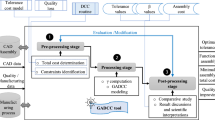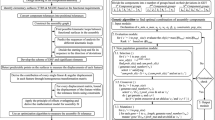Abstract
In many engineering designs, several components are often placed together in a mechanical assembly. Due to manufacturing variations, there is a tolerance associated with the nominal dimension of each component in the assembly. The goal of worst-case tolerance analysis is to determine the effect of the smallest and largest assembly dimensions on the product performance. Furthermore, to achieve product quality and robustness, designers must ensure that the product performance variation is minimal.
Recently, genetic algorithms (GAs) have gained a great deal of attention in the field of tolerance design. The main strength of GAs lies in their ability to effectively perform directed random search in a large space of design solutions and produce optimum results. However, simultaneous treatment of tolerance analysis and robust design for quality assurance via genetic algorithms has been marginal.
In this paper, we introduce a new method based on GAs, which addresses both the worst-case tolerance analysis of mechanical assemblies and robust design. A novel formulation based on manufacturing capability indices allows the GA to rank candidate designs based on varying the tolerances around the nominal design parameter values. Standard genetic operators are then applied to ensure that the product performance measure exhibits minimal variation from the desired target value. The computational results in the design of a clutch assembly highlight the advantages of the proposed methodology.
Similar content being viewed by others
References
CARLYLE, W. M., MONTGOMERY, R. C., and RUNGER, G. C., Optimization Problems and Methods in Quality Control and Improvement, Journal of Quality Technology, Vol. 32, pp. 1-31, 2000.
CREVELING, C. M., Tolerance Design: A Handbook for Developing Optimal Specifications, Addison Wesley, Reading, Massachusetts, 1997.
CHEN, J. M., and CHEN, C. H., Tolerance Design and Analysis Using the Tolerance Regions, Proceedings of the International Conference on Manufacturing Automation, pp. 523-528, 1997.
CRAIG, M., Limits of Tolerance, Manufacturing Engineer, Vol. 75, pp. 139-143, 1996.
FENG, C. X. J., and BALUSU, R., Robust Tolerance Design Considering Process Capability and Quality Loss, ASME Symposium on Conceptual and Innovative Design for Manufacturing, Vol. 03, pp. 1-14, 1999.
YANG, H., and CHEN, P. I., Robust Design: Tolerance Design Method, ASME Symposium on Conceptual and Innovative Design for Manufacturing, Vol. 3, pp. 101-116, 1999.
LIN, Y., and FOO, S. W., Fast Search Algorithm for Tolerance Design, IEE Proceedings of Circuits Devices and Systems, Vol. 145, pp. 19-23, 1998.
GREENWOOD, W. H., and CHASE, K. W., Worst-Case Tolerance Analysis with Nonlinear Problems, John Wiley, New York, NY, 1992.
EGIZIANO, L., FEMIA, N., SPAGNUOLO, G., and VOCCA, G., True Worst-Case Evaluation in Circuit Tolerance and Sensitivity Analysis Using Genetic Algorithms and Affine Mathematics, IEEE International Symposium on Circuits and Systems, Vol. 6, pp. 458-461, 1998.
HADJIHASSAN, S., WALTER, E., and PRONZATO, L., Quality Improvement via Optimization of Tolerance Intervals During the Design Stage, Applications of Interval Computations, Edited by R. Kearfott and V. Kreinovich, Kluwer Academic Publishers, Dordrecht, Holland, pp. 91-131, 1996.
PYZDEK, T., The Complete Guide to Six Sigma, Quality Publishing, Tucson, Arizona, 1999.
KARR, C. L., and FREEMAN, M., Industrial Applications of Genetic Algorithms, CRC Press, International Series on Computational Intelligence, Boca Raton, Florida, 1999.
MIETTINEN, K., Evolutionary Algorithms in Engineering and Computer Science: Recent Advances in Genetic Algorithms, Evolution Strategies, Evolutionary Programming, Genetic Programming, and Industrial Applications, John Wiley, New York, NY, 1999.
GOLDBERG, D., Genetic Algorithms and Evolution Strategy in Engineering and Computer Science: Recent Advances and Industrial Applications, John Wiley and Sons, New York, NY, 1998.
KOZA, J., BENNETT, F. H., ANDRé, D., and KEANE, M. A., Genetic Programming, III: Darwinian Invention and Problem Solving, Morgan Kaufmann, San Francisco, California, 1999.
MUSELLI, M., and RIDELLA, S., Global Optimization of Functions with Interval Genetic Algorithms, Complex Systems, Vol. 6, pp. 193-212, 1992.
GEN, M., and CHENG, R., Optimal Design of System Reliability Using Interval Programming and Genetic Algorithms, Computers and Industrial Engineering, Vol. 31, pp. 237-240, 1996.
YOKOTA, T., and GEN, M., Optimal Interval Design for System Reliability with Incomplete FDS by Means of Improved Genetic Algorithms, Electronics and Communications in Japan, Vol. 81, pp. 84-94, 1998.
FEMIA, N., and SPAGNUOLO, G., Genetic Optimization of Interval Arithmetic-Based Worst-Case Circuit Tolerance Analysis, IEEE Transactions on Circuits and Systems, I: Fundamental Theory and Applications, Vol. 46, pp. 1441-1456, 1999.
LI, W., BAI, G., ZHANG, C., and WANG, B., Optimization of Machining Data Selection and Machining Tolerance Allocation with Genetic Algorithms, International Journal of Production Research, Vol. 38, pp. 1407-1424, 2000.
LEE, J., and JOHNSON, G. E., Optimal Tolerance Allotment Using Genetic Algorithms and Truncated Monte Carlo Simulation, Computer-Aided Design, Vol. 25, pp. 601-611, 1993.
PARK, S. H., Robust Design and Analysis for Quality Engineering, Chapman and Hall, London, England, 1996.
PEACE, G. S., Taguchi Methods: A Hands-On Approach, Addison Wesley, Reading, Massachusetts, 1993.
FOROURAGHI, B., A Genetic Algorithm for Multiobjective Robust Design, Journal of Applied Intelligence, Vol. 12, pp. 151-161, 2000.
KOONS, G. F., Indices of Capability: Classical and Six Sigma Tools, Motorola University Press, Schaumburg, Illinois, 1992.
FOGEL, D. B., Evolutionary Computation: Toward a New Philosophy of Machine Intelligence, IEEE Press, Piscataway, New Jersey, 1995.
FREUND, R. J., and WILSON, W. J., Statistical Methods, Academic Press, New York, NY, 1997.
Author information
Authors and Affiliations
Rights and permissions
About this article
Cite this article
Forouraghi, B. Worst-Case Tolerance Design and Quality Assurance via Genetic Algorithms. Journal of Optimization Theory and Applications 113, 251–268 (2002). https://doi.org/10.1023/A:1014826824323
Issue Date:
DOI: https://doi.org/10.1023/A:1014826824323




